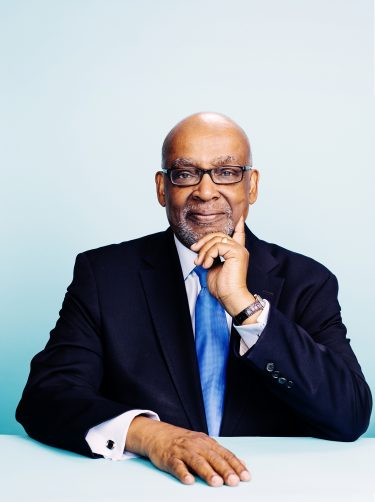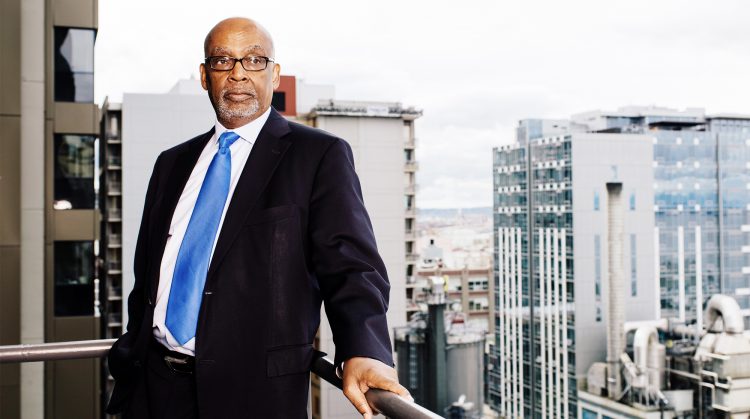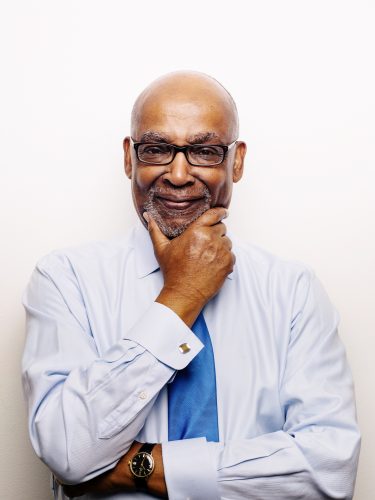On a chilly spring day, with puffy clouds scudding over Elliott Bay, former Seattle Mayor Norman Rice is about to eat a lunch of grilled trout inside the Four Seasons Hotel in downtown Seattle. Although he hasn’t been mayor of the Emerald City for 20 years, the wait staff still addresses him as “The Mayor.” It’s obvious that Rice, who is looking relaxed and dapper in corduroys, a turtleneck, gray scarf and a neatly trimmed beard, still is beloved for all he did to revive Seattle’s downtown core, neighborhoods and public schools during his two terms in office.
A Seattle resident for more than 50 years, Rice was born in Denver in 1943, the youngest son of a train porter and a beauty parlor maid. Though he was a standout high school student, college was another story, especially when he enrolled at the University of Colorado in 1961. Back then, African Americans were shut out of athletics, extracurricular activities and Greek life.
“I did party. It was pretty integrated in that respect,” laughs Rice, ’72, ’74. “I became a terrible student and took a downward turn.” He met with a college counselor, who advised him to drop out and go to trade school. “Then I flunked out of college.”
For the next seven years, Rice worked a series of jobs that didn’t reflect his potential. He served as a hospital orderly, a meter reader and toiled in the mailroom of IBM’s office in Boulder. Eventually, he got involved in community theater and was cast to play a part in Lorraine Hansberry’s “A Raisin in the Sun.” On April 4, 1968, when Martin Luther King Jr. was gunned down in Memphis, the theater troupe voted to go on with the show. That moment was a turning point for the brokenhearted Rice.

Photo: Jose Mandojana
“There’s a place in the play when the matriarch of the family says God has given the Black man nothing but dreams. It was a defining moment. I thought, I am not going to dream any more. I am going back to school,” he recalls.
Rice had a cousin in Tacoma. When he came out for a visit, he fell in love with the natural beauty of the area. He enrolled at Highline Community College and later transferred to the UW, where he earned his bachelor’s degree in communications in 1972 and his master’s degree from the Evans School of Public Policy & Governance in 1974.
“I had to go to the UW on the ‘forgiveness policy,’ my grades were so bad,” he jokes. Actually, he found community and financial help through the UW’s Educational Opportunity Program. During his time at the UW, he worked for the Urban League of Metropolitan Seattle, where he met the love of his life, Constance Rice, ’70, ’74, who served on the organization’s board and was working toward her own master’s degree in public administration at the Evans School. She later earned her doctorate in higher education administration from the College of Education and is now a member of the UW Board of Regents.
“I asked her out and she said, ‘I don’t date undergraduates.’ I had to pull out my ID and that didn’t help because then it was, ‘Why are you only a freshman?’ I wore her down. I used to write her poetry,” says Rice. Constance says that her husband of 44 years is a romantic who remembers their anniversary every year, even when she doesn’t. She also says he has a great sense of humor and is an ace at trivia knowledge and Jeopardy questions.
While a student at the UW, he worked as a reporter for KOMO-TV and KIXI radio. After that, Rice took a position in community relations for Rainier National Bank. He turned his attention to politics when he thought he might be able to contribute to the betterment of his community. He was elected to the Seattle City Council in 1978 and was reelected in 1979, 1983 and 1987. He first ran for mayor in 1985 but lost to Charles Royer, ’66. In 1988, he lost the race for a seat in Congress to another Husky, Jim McDermott, ’68. These losses—along with his failure in school—helped mold Rice’s character. The lesson wasn’t resentment and anger. The lesson was humility.
“If I hadn’t flunked out of school and lost some elections, I wouldn’t know about humility. Losing is a learning experience and a wonderful experience only when you finally win,” says Rice, chuckling in between sips of his Arnold Palmer.
What drove Rice to file for mayor the second time, on July 28, 1989, was a highly controversial issue: busing. “The flight of whites moving to the suburbs and private schools, and the tension over mandatory busing was starting to accelerate. My opponent, Doug Jewett, had come out for repealing busing, and [he proposed that] the money the city would give to the Seattle schools would be held in escrow until the school district ended busing. The district was caught in a bind. If they repealed it, they would be in contempt of federal policies. It was like a gun to the head. I waited for someone to challenge Jewett’s thinking but nobody did,” Rice recalls.

Photo: Jose Mandojana
Bob Watt, who has known Rice for 40 years and served as his deputy mayor, recalls: “On the last possible day, at the last possible moment, he filed for mayor. It was like everything else in his life—he decided on principle. With Norman, it’s always about his principles. He had the courage to overcome his fear of losing again and ran on principle and won. It’s never been about him. It’s about what we could do if we did it together.”
Rice beat Jewett decisively to become Seattle’s first and only African American mayor. Right from the get-go, Rice put his philosophy of civic engagement into practice by holding a community meeting that drew more than 4,000 Seattleites to discuss busing and education. Rice believed then—as he does now—that the way to govern is to listen to people, express an understanding of what they’re saying and then ask for help. (He has spent the past 21 months writing a book about civic engagement called “The Soul of the Messenger.” The manuscript is in the hands of a potential publisher.)
The upshot of that meeting was a $69 million Families and Education Levy that was approved by voters. But that was just the start. His agenda also included revitalizing Seattle’s downtown core in the face of some staggering losses: the closure of I. Magnin and Frederick & Nelson department stores. Rice envisioned Seattle’s core as a place where people would want to live. His partnerships with the community and business stakeholders led to the thriving downtown Seattle enjoys today.
But when Rice first voiced his hope at public meetings that people would choose to live downtown, it drew some laughs, according to Ron Sims, former King County Executive and Deputy Secretary of Housing and Urban Development, who served in county government when Rice was mayor. Sims vividly recalls Rice’s actions at a heated public meeting that he says perfectly captures the man and his principles.
“Years ago, I attended a very contentious meeting in this neighborhood [Mount Baker, where Sims still lives]. There was a shooting near Hawthorne Elementary School right before children were done for the day. It was a heated meeting; people were traumatized. I’ve never seen such kindling material in one room.
“A lady stood up and said one of those involved in the shooting was her son. People turned on her and Norman said, ‘She has the right to speak.’ Everybody quieted. She said, ‘My son walked through the neighborhood looking to mow lawns and nobody would hire him. He went to Rainier Little League Baseball and he was cut from the team. He went to the school and asked for tutors and there was nobody to tutor him. I don’t agree with what my son did but you were no help and he walked in your community every day.’ You could feel the atmosphere in the room change and the community began to accept responsibility for what happens to these kids.”
Sims said that Rice worked to change this atmosphere of indifference. Little League made the decision to not cut anybody, the line of people who volunteered to tutor exceeded the number of children who needed help and the Mount Baker Community Club Scholarship Fund began to grow, with the organization raising more than $100,000 in college scholarship money annually ever since.
In addition to reinvigorating Seattle’s schools, Rice led a comprehensive growth-management effort to partner with neighborhoods. He also secured federal, state and local funding for private-public partnerships to renew a Seattle downtown seriously on the ropes. On the national scene, Rice was the first Seattle mayor ever to become president of the U.S. Conference of Mayors.
After leaving office in 1998, he became chief executive of the Federal Home Loan Bank of Seattle, where he worked to support funding for homeowners’ programs for families with low incomes. In 2004, he became vice chairman of Capital Access LLC, an investment bank. He also served as the president and CEO of the Seattle Foundation for five years.
Whatever the course of his professional career—politician, banker, nonprofit executive—Rice has maintained a close connection to the UW, especially with the Evans School. He has served on the school’s advisory board and as a distinguished practitioner-in-residence overseeing the Civic Engagement for the 21st Century Project. That effort is aimed at designing a new model for civic engagement through seminars, workshops and research.

Photo: Jose Mandojana
“No one exemplifies the impact of an Evans School graduate better than the Honorable Norman B. Rice,” says Sandra Archibald, dean of the Evans School. “He has always led with a focus on collaboration, courage, respect, and integrity; it’s no wonder that he engendered such broad public support during his many years of public service and beyond.
“We were extremely proud to invite him to offer the keynote address at our 2016 annual Fellowship Dinner, as one of our most distinguished alumni and a member of our Honorary Advisory Board. All of us at the Evans School are so grateful for the ways he continues to inspire future generations of public leaders to follow in his public-service footsteps.”
There’s an interesting story about that Fellowship Dinner last year. Several days before he was due to speak, Rice flew to the East Coast on business and came down with an ailment that sent him to the hospital for five days. Constance told him, quite firmly, “You’re not going to be able to speak at that dinner.” The former mayor, equally adamant, replied, “Oh, yes I will.” He was there as planned. The Northwest African American Museum also holds a special place in Rice’s affections. He not only serves on the museum’s board but has worked long and hard at fundraising. Keeping the museum viable is a passion of his.
While Norman and Constance Rice are well occupied with their ongoing community service and leadership work, they do make time to enjoy the theater, movies and other Seattle cultural events. They’ve moved from their Mount Baker home to the downtown core Rice helped revive. When they’re out and about these days, it’s not uncommon for someone to recognize him and wistfully say they’d sure like to vote for him for mayor again.
Nate Miles, ’82, vice president for strategic initiatives for Eli Lilly and a former UW Foundation Board director, has known Rice for years. He says the former mayor has a reputation for his ability to build consensus. “I think that has been the secret of his success,” Miles says. “That and his genuine humility. He gets embarrassed when you stroke him. Norman is one of those people who is rare, and when you find somebody like him, you have to appreciate him.”